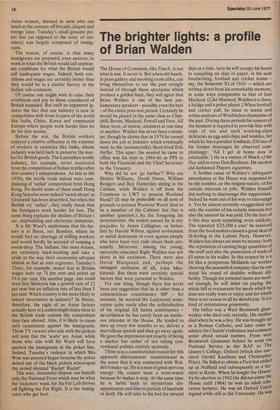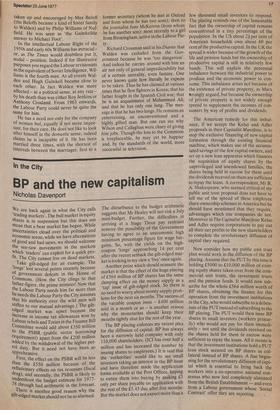The brighter lights: a profile of Brian Walden
The House of Commons, like Punch, is not what it was. It never is. But when old hands, in press gallery and smoking room alike, can bring themselves to see the past straight instead of through those spectacles which produce a golden haze, they will agree that Brian Walden is one of the best parliamentary speakers– possibly even the best – of the entire post-war period. Certainly he would be placed in the same class as Churchill, Bevan, Macleod, Powell and Foot. All these were, of course, ministers at one time or another. Walden has never been a minister, though he claims that in 1974 he turned down the job at Industry which eventually went to the (ministerially) §hort-lived Eric Heifer. This apart, the nearest he came to office was his stint in 1964-66 as PPS to both the Financial and the Chief Secretary to the Treasury.
Why did he not 'go further'? Why are Shirley Williams, David Owen, William Rodgers and Roy Hattersley sitting in the Cabinet, while Walden is off from the Commons to LWT to present Weekend World? (It may be preferable on all sorts of grounds to present Weekend World than to be a member of the Cabinet: but that is another question.). As the foregoing list demonstrates, the reason cannot lie in any prejudice by James Callaghan, or before him by Harold Wilson, against revisionists or social democrats or even against people who have been very rude about them personally. Moreover, among the young, university-educated Right Walden was not alone in his exclusion. There were also David Marquand and, perhaps the strangest exclusion of all, John Mackintosh. But there were certainly special factors that were personal to Walden.
For one thing, though there has never been any suggestion that he is other than a conscientious constituency MP – for instance, he secured the Ladywood nomination quite easily after the redistribution of his original All Saints constituency – nevertheless he has rarely been an assiduous attender at the House. He tended to turn up every few months or so, deliver a marvellous speech and then go away again. He gave the impression not exactly of being a slacker but rather of not taking conventional politics entirely seriously.
There was a constitutional reason for this apparent dilettanteism: constitutional in the sense that it was connected with Wal,den's make-up. He is a man of great nervous energy. He cannot wear a wrist-watch because he makes it stop. At the same time he is liable both to mysterious disappearances and also to periods of lassitude or sloth. He will take to his bed for several days at a time, here he will occupy his hours in compiling on slips of paper, in his neat handwriting, football and cricket teams – say, the Somerset XI of 1910 — which are written down from his remarkable memory, in some ways comparable to that of fain Macleod. (Like Macleod, Walden is a chess, a bridge and a poker player.) When football and cricket pall, he turns to tennis and writes analyses of Wimbledon champions of the past. During these periods his consort of the moment is required to provide him with cups of tea and such working-class delicacies as egg-and-chips, and winkles, for which he has a peculiar fondness. (Of one of his former • marriages he observed complainingly: 'All I get at home now is ratatouille.') He is a viewer of Match of the Day and reveres Don Bradman. He smokes old-fashioned Players cigarettes.
A further cause of Walden's infrequent attendances at the House was supposed to be the number, or the exigent nature, of his outside interests or jobs. Walden himself did nothing to discourage this supposition. Indeed he went out of his way to encourage it. Yet he almost certainly exaggerated not only the number of his outside interests but also the amount he was paid. On the face of it this may seem surprising, even unlikely. The reported '£25,000 a year' he received from the bookmakers caused a good deal of ill-feeling in the Labour Party. However, Walden has always set store by money: both the reputation of earning large quantities of the stuff and also the possession of wads of £5 notes in his wallet. In this respect he is a bit like a prosperous Midlands car worker showing the assembled company that he can stand his round of doubles without difficulty. Though his personal tastes are modest enough, he will insist on paying the whole bill at restaurants for meals which he does not really want or enjoy and for which there is no reason at all he should pay. It is a kind of ostentatious generosity.
His father was a West Bromwich glassworker who died only recently. His mother died when he was a boy. He was brought UP as a Roman Catholic, and later came to admire the Church's tolerance and common sense about sexual matters. From west Bromwich Grammar School he went via National Service in the RAF to The Queen's College, Oxford (which also nurtured Gerald Kaufman and Christopher Price). He failed to obtain a First but ended up at Nuffield and subsequently as a lecturer at Keele. When he fought the Oswestry by-election in 1962 (he did not enter the House until 1964) he was an adult education lecturer. He was an Oxford Union legend while still at the University. He was
taken up and encouraged by Max Beloff (the Beloffs became a kind of foster family to Walden) and by Philip Williams of Nuffield. He was seen as `the Gaitskellite answer to Michael Foot'.
In the intellectual Labour Right of the 1950s and early 60s Williams has a•crucial Or, as The Times would doubtless put it, nodal position. Indeed if for illustrative purposes you regard the Labour revisionists as the equivalent of Soviet Intelligence, Williams is the fourth man. At all events Walden and Hugh Gaitskell became close to each other. In fact Walden was more affected in a political sense, at any rate by his death than was either Roy Jenkins or Anthony Crosland. From 1963 onwards, the Labour Party could never be quite the same for him.
He has a need not only for the company of women but, equally if not more important, for their care. He does not like to look after himself in the domestic sense; indeed claims he is incapable of it. He has been married three times, with the shortest of intervals between the marriages: first to a
former secretary (whom he met at Oxford and from whom he has two sons); then to the journalist Jane McKerron (from whom he has another son): most recently to a girl from Birmingham, active in the Labour Par
ty.
, Richard Crossman said in his Diaries that Walden was excluded from the Government because he was `too dangerous'. And indees he carries around with him an air not only of general unpredictability but of a certain unreality, even fantasy. One never knows quite how literally he expects to be taken. Thus he has claimed at various times that he flew fighters in Korea; that his father fought in the Spanish Civil war; that he is an acquaintance of Muhanuned Ali; and that he has only one lung. The message is that he has two lungs. He remains an entertaining, an unconventional and a highly gifted man. But one can see why Wilson and Callaghan were chary of giving him jobs. Though the loss to the Commons is irreplaceable, he may yet be happier and, by the standards of the world, more successful in television.















































 Previous page
Previous page